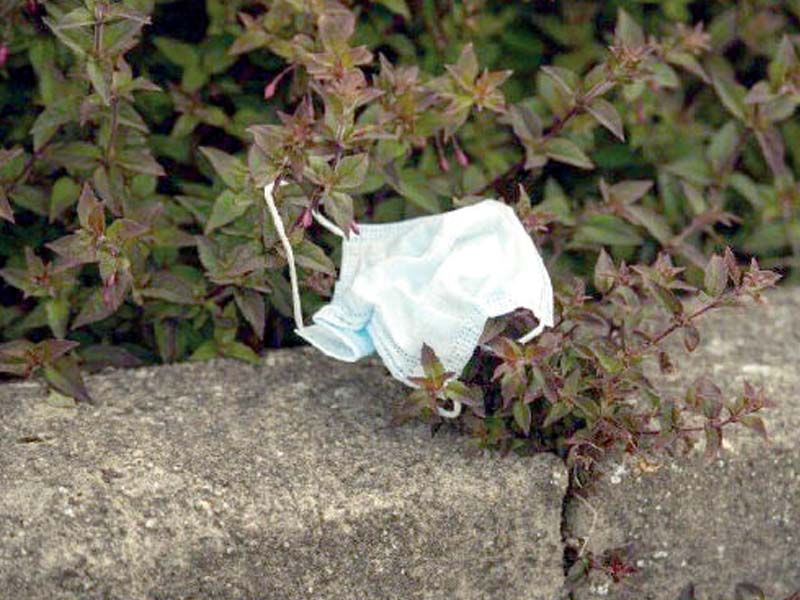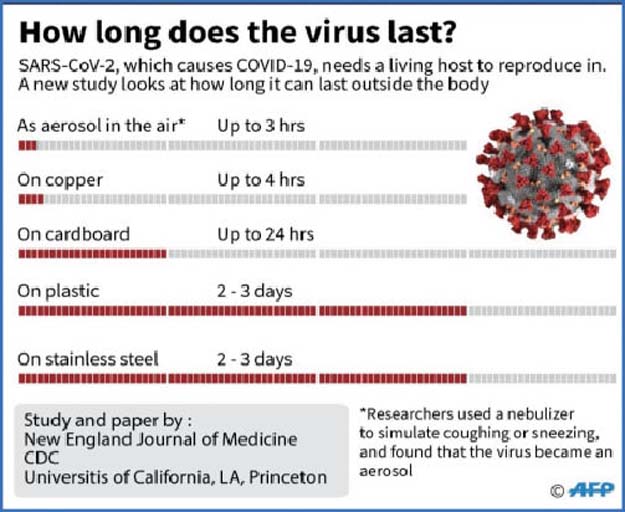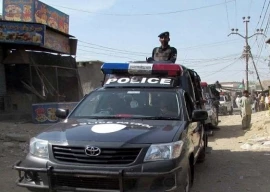
Karachi’s face mask conundrum
As protective gear becomes a coveted commodity, its improper disposal could have lasting impact on environment
KARACHI: It is not uncommon to see the unpleasant sight of discarded plastic bags littering almost every nook and corner of Karachi. Whether they are seen stuck on trees, choking the drains, or lying in heaps at various dumpsites, plastic bags are surely a nuisance.
And while environmental experts had already been struggling to come up with solutions to tackle the issue, the Covid-19 pandemic has aggravated the problem of plastic pollution in the form of discarded plastic masks and gloves.
But unlike normal plastic, used masks and gloves are not only posing a threat to the environment but they could also potentially spread the disease if not disposed of properly.
The most vulnerable
Young Feroze Khan, a waste picker, has been keenly observing the conditions of Karachi’s streets since the beginning of the pandemic. Speaking to The Express Tribune, the 22-year-old revealed that for the past few weeks, the amount of trash has increased on the streets, particularly plastic, in the form of used surgical masks.
While hospitals and health centres have proper disposal facilities for used masks and personal protective equipment (PPE), for the general public, throwing used masks on the streets after use, just as they would do with wrappers and plastic bags, has become increasingly common.
Many informal waste pickers like Feroze, who work in different areas and collect waste and litter from the streets, are particularly vulnerable to contracting the coronavirus.
“No one told me about the safety measures for any viruses. I am collecting trash just as I was doing before the lockdown,” Feroze said. “When I see a plastic mask, I go and immediately pick it up without the fear of any viruses. It seems like the disease and all the instructions [to prevent it] are for the rich. Such things do not exist in the Afghan Basti where I live.”

The real issue
According to researchers, the virus could stay viable on plastic for up to three days under laboratory conditions.
“Viruses stay alive on surfaces for a while, and this Covid-19 virus is no different,” explained Infection Control Society Pakistan president Dr Rafiq Khanani. “The virus remains alive on plastic face masks too as masks come in direct contact with the mouth. Therefore, if not properly disposed of, they can cause significant harm to the population and diminish our chance of seeing a coronavirus-free world.”
A challenge for authorities
Sindh Solid Waste Management Board’s former managing director Asif Ikram said the board had never been ready to deal with a situation wherein waste collection could act as a catalyst to spreading the disease.
Ikram pointed out that since the outbreak in Pakistan, it has become a big challenge for field workers to segregate plastic PPE from other waste.
“We were never prepared for such a situation and this pandemic has left us with no strategy for prevention,” he opined. “Moreover, nothing can be done for the safety of informal waste pickers.”
What do environmental experts say?
Ministry of Climate Change senior joint secretary Hammad Shamimi said that if immediate steps were not taken, plastic masks and gloves - which half of the population is using for protection but disposing of improperly - would lead to further spread of the virus together with environmental destruction in near future as they would eventually end up in the oceans.
“Damage to the environment will be inevitable if protective gear made of plastics is thrown away without taking proper disposal precautions,” he said. “As soon as there was a slight relaxation in the lockdown on May 10, it was awful to see piles of masks littering the city. We were already struggling with plastic pollution, particularly plastic bags, and now we have another long-term issue to deal with.”
Published in The Express Tribune, June 3rd, 2020.
1731746071-0/Untitled-design-(11)1731746071-0-270x192.webp)
1731749026-0/Copy-of-Untitled-(3)1731749026-0-270x192.webp)

1731737597-0/Untitled-design-(12)1731737597-0-270x192.webp)











COMMENTS (1)
Comments are moderated and generally will be posted if they are on-topic and not abusive.
For more information, please see our Comments FAQ